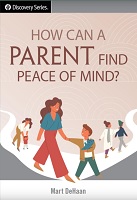
Lingering after most of the others had left, Shannon made her way toward me.
“I have a question…” she began. We had just finished our women’s Bible study, and I had remained behind to clean up. As we stood there, she opened up to me, allowing me to know her better—beyond the casual “hello” in our usual interactions. She knew that my husband and I had been in youth ministry for several years, and as her oldest child was nearing pre-adolescence, she was anxious about the approaching teen years.
She was torn between allowing her daughter to do what the rest of her peers were doing, which would help her gain social acceptance, and guiding her daughter to live by God’s ways.
How Can A Parent Find Peace of Mind?
Get our latest parenting resource!
Our latest resource, How Can a Parent Find Peace of Mind?, is now available.
Every month, we roll out a new resource for families. Subscribe to our email updates, and be the first to get a copy!
As she considered her options, Shannon could feel again the social ostracism of her own teen years. She didn’t want her daughter to be lonely, or to feel left out. She feared that if she didn’t allow her daughter to join in the God-displeasing acts that other teens were doing, she would be throwing her daughter into an isolated and friendless existence.
As I shared with her from our ministry experiences and assured her that helping our teens to value God’s opinion is more important, I could see Shannon’s internal struggle. Sadly, in the end, the need for her daughter to be popular carried greater weight than teaching her daughter to honour and please God.
As it turned out, her daughter learned to fit in—a little too well. Beautiful and talented, she dated the popular guy, who was charismatic but all too willing to push sexual boundaries in order to gain what he desired.
Help Our Children Embrace God’s Kingdom Values
Today, Scott and I have more than five decades of youth ministry experience between the two of us. But even with our own children nearing the end of their teenage years, we’re far from having all the answers.
Swimming upstream in a culture of compromise is never easy. The distinction can be confusing, especially when our kids see that some of those moving so effortlessly downstream claim to carry the name of Christ. As parents, though, we have a responsibility to help our kids value a kingdom they cannot see with their eyes.
As parents, though, we have a responsibility to help our kids value a kingdom they cannot see with their eyes.
We’ve had more than one occasion when we have gone head to head with our kids and their temptation to win the approval of others over God’s approval.
Sometimes, the issue has been a non-essential one, and their desire to adopt the latest trend benign. On other occasions, we have looked at them as tears streamed down their faces and said: “We know we are asking you to do a very hard thing in not following everyone else. But if we didn’t believe it was best, we wouldn’t ask you to take on this challenge.”
Teach Them to Value God’s Heart
While there may be stages in our children’s development where we require them to follow our instructions because of our spiritual authority as their parents, our ultimate aim is to teach them how to value the heart of God over the pleasures of this world in their decision-making long before they leave our homes. After all, being a Christ follower isn’t about keeping a list of rules; rather, it’s about loving God. 1 John 2:15–17 reminds us:
“Do not love the world or anything in the world.
If anyone loves the world, love for the Father is not in them.
For everything in the world—the lust of the flesh,
the lust of the eyes, and the pride of life—
comes not from the Father but from the world.
The world and its desires pass away,
but whoever does the will of God lives forever.”
We can’t hold fast to what this world values and love Jesus at the same time.
We can’t hold fast to what this world values and love Jesus at the same time. In fact, Jesus, prepared His disciples for the dissonance they would feel with the culture around them. He said: “If the world hates you, keep in mind that it hated me first. If you belonged to the world, it would love you as its own. As it is, you do not belong to the world, but I have chosen you out of the world. That is why the world hates you” (John 15:18–19).
It’s Not Easy, But It’s Important
There will be times when our kids will understand why we are asking them to walk the hard road of not fitting in with everyone else; and there will be times when they won’t.
During those moments when they resist our loving instructions, let’s remain strong and strive to help them keep their eyes set on the real heart of the matter—an unhindered relationship with Christ Jesus.
Godly shepherding isn’t always comfortable and painless, but it’s necessary.
Proverbs 19:18 exhorts us: “Discipline your children, for in that there is hope; do not be a willing party to their death.” Godly shepherding isn’t always comfortable and painless, but it’s necessary.
If we really believe that the “thief’s purpose is to steal and kill and destroy” but that God desires “to give them a rich and satisfying life” (John 10:10 NLT), then we will be willing to spend the time and energy to guide them and reason with them to help them see the wisdom in following God’s ways that will preserve their physical, emotional, and spiritual health.
It Begins with Us Seeing the Issue Clearly
To guide our children wisely, we have to be willing to deal with our own insecurities.
If we see their struggles through our scars, we may be tempted to overlook an issue that needs to be addressed or tempted to avoid having a tough conversation with our children. We cannot underestimate the power of vicarious acceptance.
In other words, it feels validating to us when our kids gain or achieve something we didn’t experience. Being led by our own need for approval can cause us to lead our children down a path of compromise. Proverbs 28:26 says: “Those who trust their own insight are foolish, but anyone who walks in wisdom is safe.”
When our hearts try to convince us that our worth—or that of our children—can be found in emulating what popular culture says is good, we must lean on the wisdom of the Holy Spirit. Like the 18th century North American revivalist, Jonathan Edwards, may we cry out, “Lord, stamp eternity on my eyeballs.” Only then will we be able to know that we are seeing straight.




